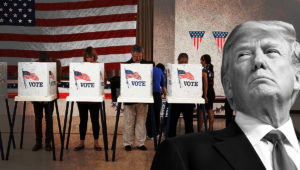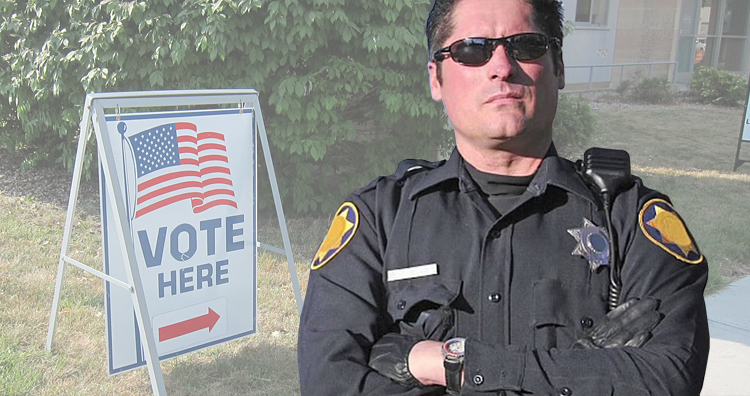
Intimidation at the polls: Trump’s election patrols
On November 3, 1981, during the New Jersey gubernatorial election, the Republican National Committee deployed a massive electoral patrol operation to ensure that their party’s candidate won. After counting ballots for several weeks, the final result was released: Republican Thomas Kean ‘won’ by a 1,797 vote margin. On that occasion, Kean’s campaign manager was Roger Stone, a Trump friend, and one of the main architects of what many saw as a fraudulent election.
That election, and the tactics used, illustrates a scandalous example of a Republican offensive of voter harassment and intimidation. Everything was made possible thanks to the creation of the so-called National Ballot Security Task Force. This task force consisted of local sheriffs and police officers hired by Republicans to threaten and coerce Black and Hispanic voters.
These agents were off duty on that election day, but carried their service weapons, used their system of communications (for while they’re on duty) and displayed the identification bracelet of the task force. That November 3, those electoral patrols were dedicated to preventing minority voters from arriving at the voting centers, and several of those who made it were often violently removed.
In this context and as part of this campaign of fear, according to the publication The Conversation, posters were hung in the vicinity of the electoral precincts alluding to the fact that this area was patrolled by the National Ballot Security Task Force. They also released notices promoting a $1,000 reward for individuals who provided information on alleged violations of state electoral laws.
 After these events, the Democratic Party decided to file a lawsuit in December 1981 arguing that this type of intimidation and repression against Black and Hispanic voters should not be allowed. As a result, in November 1982, based on a court order, a document known as a “consent decree” was issued. The text signed by the Republicans indicated that they would not use racial criteria again to guarantee the “security of the ballots” nor would they deploy armed electoral observers. Although the Republican Party continued to engage in voter suppression practices for several decades, thereafter they were unable to run a New Jersey-style campaign.
After these events, the Democratic Party decided to file a lawsuit in December 1981 arguing that this type of intimidation and repression against Black and Hispanic voters should not be allowed. As a result, in November 1982, based on a court order, a document known as a “consent decree” was issued. The text signed by the Republicans indicated that they would not use racial criteria again to guarantee the “security of the ballots” nor would they deploy armed electoral observers. Although the Republican Party continued to engage in voter suppression practices for several decades, thereafter they were unable to run a New Jersey-style campaign.
But just two years ago, a judge in that same state of New Jersey vacated that court order after years of attempts by Republicans. After almost four decades, and coincidentally during the Trump presidency, the situation has changed substantially and the conditions have been created for the deployment of a strong offensive in 2020. According to Rolling Stone Magazine, Trump campaign lawyer Justin Clark said of this decision: “For 40 years the Republican Party has been fighting this battle with one hand tied behind its back.”
The lifting of this ban has generated enthusiasm among Republican Party members in charge of implementing plans to obstruct the vote of the Democratic base. According to The Intercept, Clark himself, at the end of 2019 in a meeting with the National Association of Republican Lawyers, affirmed that the difference between the 2020 election day and that of 2016 is that the consent decree no longer limits them and he emphasized “it will be a larger, much more aggressive and better funded program.”
It is clear that the New Jersey experience resonates strongly with the Trump campaign team as a plan to follow. Inspired by this example, for some time now they have been organizing a group of actions aimed at ensuring that on November 3, around 50,000 electoral observers will be able to prevent a possible Democratic victory.
To achieve this, campaign strategists and the Republican National Committee have developed a blueprint that encompasses the following: strong financial backing, coordination structures, legal action in competitive states, and execution of operations on Election Day. This scaffolding is necessary to ensure the effective selection, recruitment, training and deployment of Trump’s electoral patrols in key polling places in decisive states.
Regarding the financing, the campaign is funded with millions of dollars donated by a powerful network of businessmen, conservative activists, and organizations linked to the religious right, that have made the decision to support Trump under the conviction that he is the right president to protect their interests. At the center of this financial plan is the Honest Elections Project, an institution created in February 2020 that promotes campaigns aimed at suppressing the vote.
Organizing this initiative is the influential lawyer and conservative activist Leonard Leo, who is a major donor to Donald Trump, and the architect of the Supreme Court appointments of Justices Neil Gorsuch and Brett Kavanaugh. According to the newspaper The Guardian, this organization is financed with so-called “dark money”. [Dark money refers to political spending by nonprofit organizations that are not required to disclose their donors. Such organizations can receive unlimited donations from corporations, individuals and unions.]
Among the organizational mechanisms, the True the Vote group stands out. It is registered as a non-profit institution to preserve the “integrity of elections.” Catherine Engelbrecht, the group’s director, is coordinating the selection, recruitment and training of Republican electoral observers. According to The Intercept, during a conference held in February of this year, and sponsored by representatives of the religious right, the need to recruit former military personnel for these functions was discussed. At that event, Engelbrecht emphasized that these people “understand and respect law, order and the chain of command.”
According to The Intercept, the organization True the Vote is recruiting former members of the U.S. Armed Forces and former policemen to be part of the electoral patrols. With that same objective, they have launched an initiative called “Continuing in Service” whereby they sell the idea that getting involved in this type of activity is as if they were in combat and would be considered “first responders.”
The work of recruitment has been rolled out simultaneously in multiple states. In this context, the National Association of Republican Lawyers participates in sessions preparing the people who have been selected so that they know the necessary legal elements. The Republican Party has already hired election day directors in 15 key states. These persons and their assistants will be responsible for recruiting and training election observers.
As for legal action, the Republican National Committee announced in February that they would spend $10 million filing lawsuits. As of this month, that figure has risen to $20 million as lawsuits have been filed in a dozen states, including Michigan, Minnesota, Pennsylvania and Florida. In Florida, the claims are fundamentally aimed at preventing the state from paying for the stamps of mail-in ballots, and that ballots stamped on election day are not counted. In essence, the goal is to prevent people’s ability to vote, particularly those classified as low income voters.
Their strategic purpose is the reelection of Donald Trump under any circumstance and using all available means. Based on this logic, Republicans consider the maneuvers carried out on November 3 as important. And they consider possibly decisive the role played by their electoral observers. Therefore, a strong presence of these persons is to be expected at voting centers deemed decisive in the outcome of the election.
Recently Fox News, during an interview with Trump, asked him if he planned to have election observers. He replied: “We are going to have everything. We are going to have sheriffs and law enforcement officers.” Although this is not legal, it is clear that patrols made up of Trump loyalists will be deployed, employing intimidating tactics such as: exhaustive verification of minority voters, harassment of these people around the precincts, promoting altercations in the polling places, and pressuring authorities during the counting of the ballots.
This type of behavior — and under the current circumstances in the U.S. marked by deep polarization and violence — can only result in dangerous confrontations, riots and police repression. The level of aggressiveness in the demonstrations, and its impact at the national level, would be unprecedented compared to the protests that are taking place at the moment.
This possible scenario would deepen that “season of darkness” characterized by anger, fear and division, and mentioned by Joe Biden during his speech at the Democratic National Convention. The only alternative to avoiding such a situation is for an avalanche of voters to decide that Donald Trump has caused enough damage to the U.S. and the rest of the world. This must be overwhelmingly reflected at the polls on Nov. 3. That is the only option.

